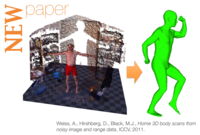
Intelligent systems perceive, act and learn. They adapt to complex, changing, environments to survive and achieve goals. At the MPI for Intelligent Systems, we study such "intelligent behavior" at multiple length scales, from the nano to the macro, using disciplines as varied as biology, material science, computer science, and mathematics.
Our neighboring institute for Biological Cybernetics in Tübingen studies biological intelligent systems to understand how nature implements perception, action and learning. In contrast, we build and study synthetic systems. These systems may be nano- or micro-robots, new types of material, bio-hybrid systems, humanoid robots, or purely computational systems that exist in a world of complex digital data.
The concept behind the institute is to bring together researchers studying intelligent systems at different scales and with different methods in the hope that we can all learn from each other to uncover principles of autonomous behavior that are scale free.
The institute has two locations, building on the local strengths of each. Our Stuttgart facility focuses on material systems, bio-hybrid systems, self organization, nano-scale robotics, and synthetic biology. Our Tübingen site focuses on computational systems for sensing, motor control and learning that leverage our collaborations in neuroscience, cognitive science, and medicine.
We have a rich, interdisciplinary, environment. For example, one can attend a talk in the morning on how to program cells using DNA and then a talk on programming robots to walk in the afternoon. We believe that such an open environment of discovery will lead to exciting new science that will have practical benefits for society ranging from new materials, medical technologies, and assistive robotics.
Our neighboring institute for Biological Cybernetics in Tübingen studies biological intelligent systems to understand how nature implements perception, action and learning. In contrast, we build and study synthetic systems. These systems may be nano- or micro-robots, new types of material, bio-hybrid systems, humanoid robots, or purely computational systems that exist in a world of complex digital data.
The concept behind the institute is to bring together researchers studying intelligent systems at different scales and with different methods in the hope that we can all learn from each other to uncover principles of autonomous behavior that are scale free.
The institute has two locations, building on the local strengths of each. Our Stuttgart facility focuses on material systems, bio-hybrid systems, self organization, nano-scale robotics, and synthetic biology. Our Tübingen site focuses on computational systems for sensing, motor control and learning that leverage our collaborations in neuroscience, cognitive science, and medicine.
We have a rich, interdisciplinary, environment. For example, one can attend a talk in the morning on how to program cells using DNA and then a talk on programming robots to walk in the afternoon. We believe that such an open environment of discovery will lead to exciting new science that will have practical benefits for society ranging from new materials, medical technologies, and assistive robotics.
Address:
Spemannstrasse 41
72076 Tübingen
Germany
Phone: +49 (0)7071 601-1800
Fax : +49 (0)7071 601-1802
Spemannstrasse 41
72076 Tübingen
Germany
Phone: +49 (0)7071 601-1800
Fax : +49 (0)7071 601-1802
Max Planck Institute for Intelligent Systems, Stuttgart
Address:
Heisenbergstr. 3
70569 Stuttgart
Phone: +49 (0)711 689-0
Fax: +49 (0)711 689-1010
Heisenbergstr. 3
70569 Stuttgart
Phone: +49 (0)711 689-0
Fax: +49 (0)711 689-1010
Scenes from Video Workshop, Barossa Valley, Australia, Dec. 10-13, 2013
New BMI visualizer on-line. Visualize your BMI and learn how BMI relates to body shape using our 3D body visualization tool.
The 3D shape of the human body is useful for applications in fitness, games and apparel. Accurate body scanners, however, are expensive, limiting the availability of 3D body models. We present a method for human shape reconstruction from noisy monocular image and range data using a single inexpensive commodity sensor (the Kinect).



